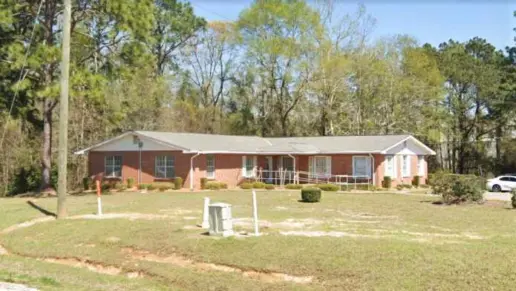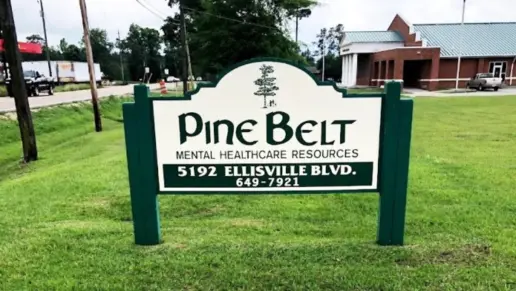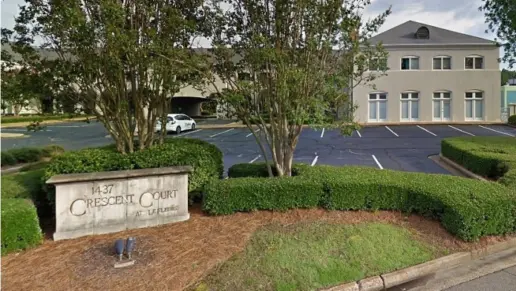My experience in this place was very challenging, but every effort really worth now I feel better than I have in a long time. My therapist is an excellent counselor, he listens to me and truly does everything he can to help. I would like to say thanks to everyone who was par ...
About Oxford Treatment Center
Oxford Treatment Center is located in Etta, Mississippi. At this facility, they specialize in providing treatment to adults who are struggling with addiction. The levels of care offered here include medical detox, inpatient care, partial hospitalization, intensive as well as traditional outpatient services and supportive sober living. They also offer programs specialized for veterans, first responders and married couples and a faith based rehab. They accept a multitude of insurances and offer flexible payment options including card or cash payments.
What sticks out to me most is the special care they provide for everyone, including treatment for married couples. This can be for you, your significant other or both of you can receive treatment and healing individually and also together to help strengthen your relationship.
Seeking treatment together at this facility is most beneficial to couples who are both on the same page with wanting to transform their lives and are willing to put in inner work and receive support and guidance from licensed professionals. This can help you both build communication skills, improve the quality of your relationship and also lower the risks of dangers such as domestic violence, separation and divorce.
Being able to receive the care you need as well as your loved one helps you stay focused on the importance of improving your livelihood and motivates you to stay on the right track to allow the relationship to grow in the process as well. Individual counseling sessions as well as support groups will be part of your treatment plan.
They also offer faith based rehab at this facility. This treatment approach will help you strengthen your relationship with God and more importantly heal your mental and emotional wellbeing. Christian rehab helps you restore your faith and belief in the God of your understanding while being able to read biblical scriptures and receive Christian counseling. This facility offers sunday church services as well and can also encourage you to stay connected with others on the same journey as you.
Latest Reviews
Rehab Score
Gallery

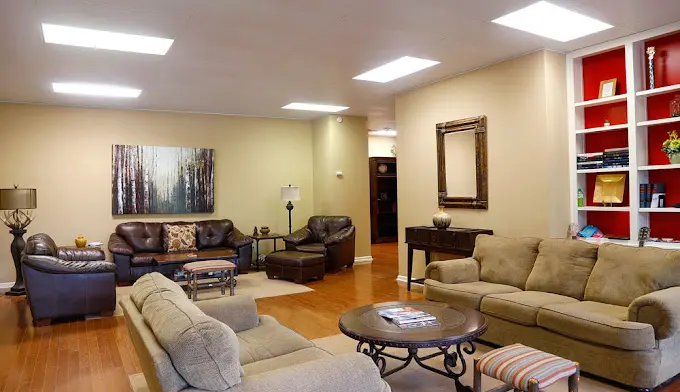
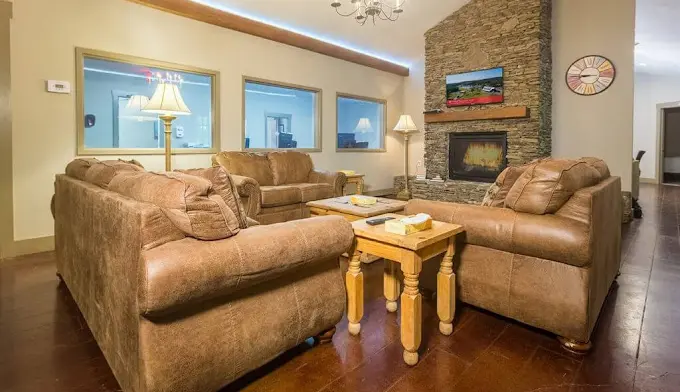

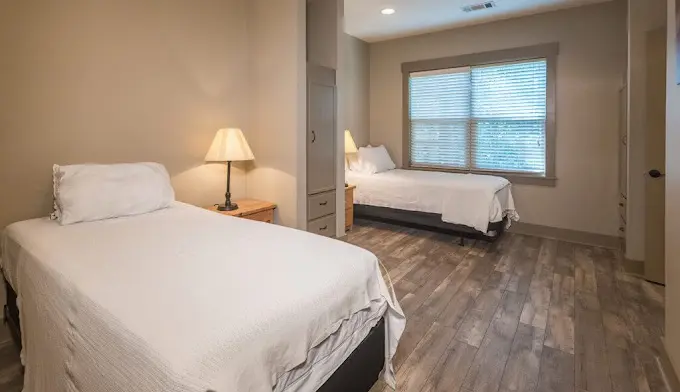
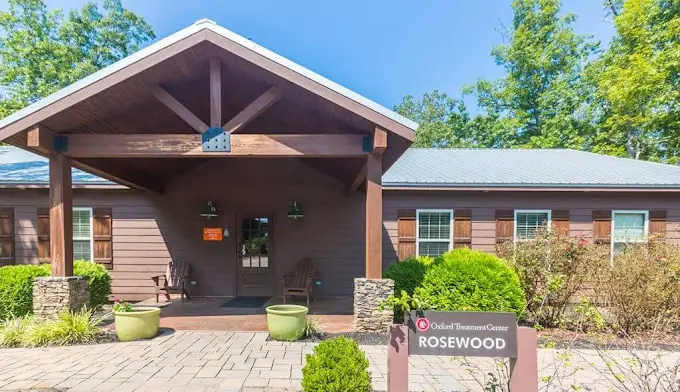
Location
Accepted Insurance
Other Forms of Payment
Private insurance refers to any kind of healthcare coverage that isn't from the state or federal government. This includes individual and family plans offered by an employer or purchased from the Insurance Marketplace. Every plan will have different requirements and out of pocket costs so be sure to get the full details before you start treatment.
Self-pay involves paying for treatment out of your own pocket. You can use savings or credit, get a personal loan, or receive help from family and friends to fund your treatment. If you don't have insurance or your insurance plan doesn't cover a specific program, self-pay can help ensure you still get the care you need.
Military members, veterans, and eligible dependents have access to specific insurance programs that help them get the care they need. TRICARE and VA insurance can help you access low cost or no cost addiction and mental health treatment. Programs that accept military insurance often have targeted treatment focused on the unique challenges military members, veterans, and their families face.
Medicaid is a state based program that helps lower-income individuals and families pay for healthcare. Medicaid covers addiction treatment so those enrolled can use their coverage to pay for rehab. When a program accepts Medicaid the client often pays very little or nothing out of their own pocket.
Addiction Treatments
Levels of Care
Treatments
The goal of treatment for alcoholism is abstinence. Those with poor social support, poor motivation, or psychiatric disorders tend to relapse within a few years of treatment. For these people, success is measured by longer periods of abstinence, reduced use of alcohol, better health, and improved social functioning. Recovery and Maintenance are usually based on 12 step programs and AA meetings.
For those seeking help with addiction, a drug rehab in Mississippi offers the necessary care to achieve long-term recovery. Options include inpatient, residential, partial hospitalization, intensive outpatient, and long-term drug rehab in Mississippi.
Many of those suffering from addiction also suffer from mental or emotional illnesses like schizophrenia, bipolar disorder, depression, or anxiety disorders. Rehab and other substance abuse facilities treating those with a dual diagnosis or co-occurring disorder administer psychiatric treatment to address the person's mental health issue in addition to drug and alcohol rehabilitation.
Opioid rehabs specialize in supporting those recovering from opioid addiction. They treat those suffering from addiction to illegal opioids like heroin, as well as prescription drugs like oxycodone. These centers typically combine both physical as well as mental and emotional support to help stop addiction. Physical support often includes medical detox and subsequent medical support (including medication), and mental support includes in-depth therapy to address the underlying causes of addiction.
Substance rehabs focus on helping individuals recover from substance abuse, including alcohol and drug addiction (both illegal and prescription drugs). They often include the opportunity to engage in both individual as well as group therapy.
Programs




Clinical Services
If you participate in cognitive behavioral therapy in Mississippi, you can expect to receive homework exercises that allow you to practice the skills you discuss during your sessions. You'll learn how to develop coping skills and change your thinking and behavior so you can break free from addiction.
Treatment that includes dialectical behavior therapy in Mississippi gives you specific tools for managing challenging situations. You'll learn how to identify and change unhealthy thought patterns. You'll also attend group training sessions where you can start applying the skills you're learning in treatment.
A signature piece in Oxford Treatment Center’s residential treatment program is Equine Therapy. It’s a powerful means of learning new instincts for healthy living — trusting nature’s experts to lead the way. Under the direction of a Certified Equine Therapy Specialist, patients at Oxford Treatment Center will interact with horses for a minimum of 10-12 hours during their stay. For many, the long trail rides through Oxford Treatment Center’s many miles of nature paths are a highlight of their experience. Equine Therapy is about much more than just recreational riding. Work and observation in the world of horses lends itself to powerful metaphors into the patient’s self-defeating patterns of behavior and nonverbal messages. Equine-assisted therapy helps patients more fully recognize their self-defeating behaviors while also building upon their individual strengths. Horses are skilled at keeping themselves safe. They know how to survive. The choices they make are naturally those which protect their own wellbeing. For addicts and alcoholics, there is much to learn from equine instincts.
Group therapy is any therapeutic work that happens in a group (not one-on-one). There are a number of different group therapy modalities, including support groups, experiential therapy, psycho-education, and more. Group therapy involves treatment as well as processing interaction between group members.
In individual therapy, a patient meets one-on-one with a trained psychologist or counselor. Therapy is a pivotal part of effective substance abuse treatment, as it often covers root causes of addiction, including challenges faced by the patient in their social, family, and work/school life.
For many people, a lifelong struggle with drug or alcohol addiction can be traced back to traumatic experiences in the past. The best hope for recovery comes through addressing not only the addiction, but also the pain that has fueled it. Oxford Treatment Center provides supportive interventions for patients with a history of trauma. Acknowledging past trauma can help patients take the first steps toward overcoming it and enable them to more fully benefit from the overall treatment program.
Involving family members and significant others in the patient’s recovery process is a hallmark of Oxford Treatment Center’s comprehensive addiction treatment program. Through their robust Family Program, Oxford Treatment Center makes it a priority to invest in and care for the individuals whose support will be critical in a patient’s recovery. Family members and significant others know well the wrenching pain of living with someone in active addiction. Through Oxford Treatment Center, they too can embrace hope for a new life as they walk alongside a loved one in recovery.
Often, substance use and mental health disorders weaken basic life skills. This makes daily functioning a challenge and can lead to a cycle of addiction. To help you break free from this cycle, drug rehab programs include integrated life skills training which helps you redevelop or strengthen the life skills you need for success.
Recreational therapy is a holistic approach to drug and alcohol addiction treatment in Mississippi. It integrates activities like hiking, art, and team sports to improve your physical fitness and give you an outlet to express your emotions and stress. Recreational therapy helps people who are rebuilding their lives to maintain long term sobriety.
Creativity is inherently healing, and can help those in recovery express thoughts or feelings they might not otherwise be able to. Creative arts therapy can include music, poetry/writing, painting, sculpting, dance, theater, sandplay, and more. Unlike traditional art, the final product matters far less than the experience of creation and expression itself.
Oxford Treatment Center provides a program that’s structured to include a rich range of experiential therapies in which each patient will take part. experiential therapy is not a single type of therapy, but instead a category of therapy types. What these therapy types have in common is that they are designed to immerse an individual in activities or actions that help in recognizing the emotions or responses that arise from certain situations in the person’s life. Some of the activities are designed to recreate situations that might cause the emotions or behaviors to arise, while others are creative or immersive activities that are undertaken while the person is actively discussing, thinking about, or otherwise processing elements of daily life. Experiential therapy helps to tap into these feelings, bringing up memories or issues that, when processed, can give the person a better chance at managing the addiction over the long-term.
Amenities
-
Private Setting
-
Lakeside
-
Hiking
-
Gym
-
Wifi
Staff & Accreditations
Staff
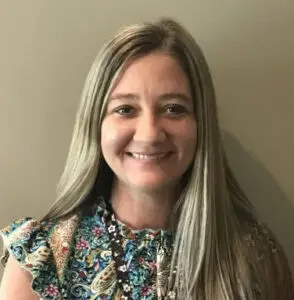
Director of Nursing

Direct Care Coordinator

Counselor
Accreditations

The Joint Commission, formerly known as JCAHO, is a nonprofit organization that accredits rehab organizations and programs. Founded in 1951, the Joint Commision's mission is to improve the quality of patient care and demonstrating the quality of patient care.
Joint Commission Accreditation: Yes
Contact Information
297 Co Rd 244
Etta, MS 38627




